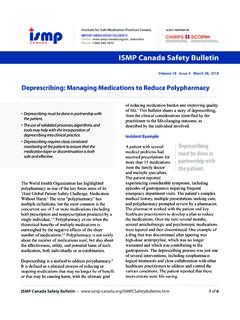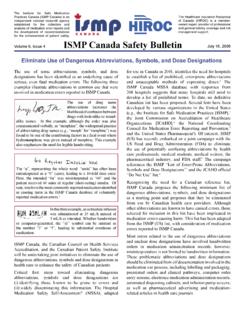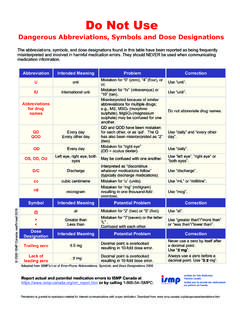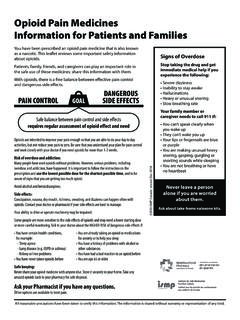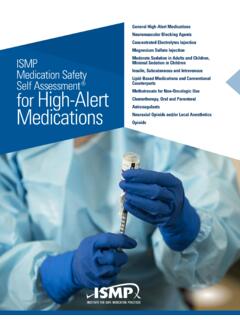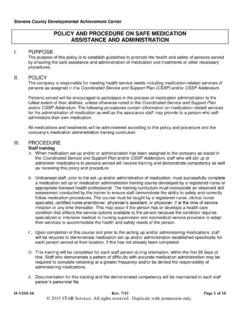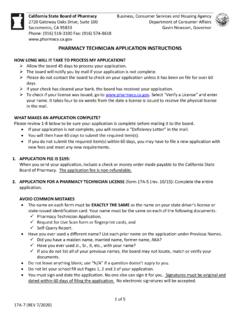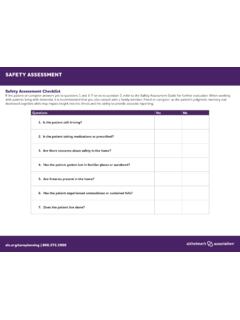Transcription of Medication Error and Patient Safety: A Systems Approach
1 Medication Error and Patient safety : A Systems Approach Building the Foundation November 18, 2015. Julie Greenall, RPh, BScPhm, MHSc, FSMPC. Project Director, ISMP Canada Institute for Safe Medication Practices Canada 2015 . ISMP Canada ISMP Canada is an independent not-for-profit organization dedicated to reducing preventable harm from medications. Our goal is the creation of safe and reliable Systems for managing medications in all healthcare environments. Institute for Safe Medication Practices Canada 2015 . safety Bulletins Institute for Safe Medication Practices Canada 2015 . Bulletin Subscriptions Institute for Safe Medication Practices Canada 2015 . ISMP Canada self -Assessment Programs Institute for Safe Medication Practices Canada 2015 . Learning Objectives After attending this lecture and completing the assigned readings, students should be able to: 1.
2 Define key terms associated with Patient safety in health care. 2. State the evidence that medical Error , and Medication Error in particular, is a significant problem in healthcare. 3. Understand the latent failure model and human factors engineering to explain Medication Error as multisystem failures. 4. Understand the impact of Medication Error on the individual Patient and/or family. 5. Understand how the traditional culture and values in healthcare interfere with health care providers ability to acknowledge and respond to Error . Institute for Safe Medication Practices Canada 2015 . Alignment with CPSI. Patient safety Competencies 1. Contribute to a culture of safety 2. Work in teams for Patient safety 3. Communicate effectively for Patient safety 4. Manage safety risks 5. Optimize human and environmental factors 6. Recognize, respond to and disclose adverse events Institute for Safe Medication Practices Canada 2015.
3 Background Reading Baker GR, Norton PG, Flintoft V, Blais R, Brown A, Cox J, et al. The Canadian Adverse Events Study: the incidence of adverse events among hospital patients in Canada. CMAJ. 2004 May 25; 170(11):1678-86. Matlow AG, Baker GR, Flintoft V, et al. Adverse events among children in Canadian hospitals: the Canadian Paediatric Adverse Events Study. CMAJ 2012:184(13): 790- 781. Prowse DE, Long S. Healing after harm. Pharmacy Practice 2014; 1(4): 23-25. Reason J. Human Error : Models and management. BMJ. 2000; 320:768-770. Institute for Safe Medication Practices Canada 2015 . Objective 1. Define key terms associated with Patient safety in health care. Institute for Safe Medication Practices Canada 2015 . Key Terms and Concepts Adverse Event: Undesired and unplanned occurrence, directly associated with the care or services provided to a Patient /client in the health care system.
4 Includes both preventable and non-preventable injuries. The Canadian Patient safety Dictionary Adverse Drug Event: An injury from a medicine or lack of an intended medicine. Includes adverse drug reactions and harm from Medication incidents. Adapted from Bates DW et al by the collaborating parties of the CMIRPS, 2005. Institute for Safe Medication Practices Canada 2015 . Key Terms and Concepts safety : Freedom from accidental injuries. Kohn LT, Corrigan JM, Donaldson MS, eds. To err is human: Building a safer health system, 1999. Harm: Temporary or permanent impairment in body functions or structures. Includes mental, physical, sensory functions and pain. Developed by the collaborating parties of the Canadian Medication Incident Reporting and Prevention System (CMIRPS), 2005. Institute for Safe Medication Practices Canada 2015.
5 Key Terms and Concepts Critical Incident: An incident resulting in serious harm (loss of life, limb, or vital organ) to the Patient , or the significant risk thereof. Incidents are considered critical when there is an evident need for immediate investigation and response. The investigation is designed to identify contributing factors and the response includes actions to reduce the likelihood of recurrence. Davies J, Hebert P and Hoffman C, Canadian Patient safety Dictionary (Ottawa: Royal College of Physicians and Surgeons of Canada, 2003). Institute for Safe Medication Practices Canada 2015 . Key Terms and Concepts Near Miss An event that could have resulted in unwanted consequences, but did not because, either by chance or through timely intervention, the event did not reach the Patient . Developed by the collaborating parties of the Canadian Medication Incident Reporting and Prevention System.
6 2005. Institute for Safe Medication Practices Canada 2015 . Key Terms and Concepts High-Alert Medications Drugs that bear a heightened risk of causing significant Patient harm when they are used in Error . ISMP's List of High-Alert Medications. Available at: Institute for Safe Medication Practices Canada 2015 . High Alert Medications Can you think of examples of medications that might be considered high alert? Institute for Safe Medication Practices Canada 2015 . Objective 2. To state the evidence that medical Error , and Medication Error in particular, is a significant problem in healthcare. Is there a problem? . Institute for Safe Medication Practices Canada 2015 . To Err Is Human: Building A Safer Health System Institute of Medicine (IOM) Report in 1999. Estimated 44,000 to 98,000 deaths yearly due to Error . 44,000 = 8th leading cause of death in 7,000 die from Medication errors Institute for Safe Medication Practices Canada 2015.
7 Preventable medical mistakes cause more deaths per year than car accidents, breast cancer or AIDS. Deaths per Year 98,000. 43,458 42,297. 16,516. Preventable Car Accidents Breast Cancer AIDS. Medical Mistakes Source: The Institute of Medicine: To Err is Human: Building a safer health system, 1999. Additional estimates from the Centres for Disease Control and Prevention, National Vital Statistics Reports, Vol. 47, No. 25. Institute for Safe Medication Practices Canada 2015 . The Canadian Adverse Events Study 3745 charts reviewed from 5 provinces 360 adverse events identified in 255 patients 24% of adverse events were related to Medication or fluid administration 37% of adverse events were determined to be preventable Extrapolation: (or 187,500) patients in Canadian hospitals were seriously harmed by their care. As many as 9,250 to 23,750 people died in a Canadian hospital as a result of medical errors.
8 Baker et al, CMAJ, May 25, 2004; 1780(11): 1678-1686. Institute for Safe Medication Practices Canada 2015 . Institute of Medicine (IOM): Preventing Medication Errors 2006. Medications harm too many at least million people per year Hospitals 400,000 preventable ADEs per year About 1 Medication Error per Patient per day Outpatient setting Also frequent, though data less solid 530,000 ADEs/year in Medicare patients Institute for Safe Medication Practices Canada 2015 . Canadian Paediatric Adverse Events Study 3669 children admitted from April 2008-March 2009. 8 academic paediatric centres and 14 community hospitals in Canada Weighted rate of adverse events was academic paediatric centre vs. in community hospitals Preventable adverse events in academic centres vs. in community hospitals Surgical events ; drug-related Institute for Safe Medication Practices Canada 2015.
9 Numerous high profile examples of errors causing harm Institute for Safe Medication Practices Canada 2015 . Heparin Mix-Ups Sept 06. 3 premature infants died after having vascular access lines flushed with 10,000. units of heparin instead of 10 units Nov 07. Similar Error in 3. neonates all survive Institute for Safe Medication Practices Canada 2015 . ASHP Midyear 2009 Keynote Address Institute for Safe Medication Practices Canada 2015 . Adverse Drug Events in LTC. Retrospective chart review in 2 facilities 42%1 - 51%2 of adverse drug events are considered preventable Errors associated with preventable events most often related to ordering and monitoring stages of the Medication use process Increased risk of events with antipsychotics, diuretics and antiepileptic agents. 1 GurwitzJH et al. Am J Med 2005;118:251-258. 2 Gurwitz JH et al.
10 Am J Med 2000;109:87-94. Institute for Safe Medication Practices Canada 2015 . What about community pharmacy? Observational study in 50 pharmacies in 6 US cities . one pharmacist inspected 100 prescriptions Overall dispensing accuracy 77 errors in 4481 prescriptions 5 clinically important Extrapolation Approximately 4 errors per day if pharmacy fills 250. prescriptions million errors in the US annually (3 billion prescriptions filled annually). Flynn EA, Barker KN, Carnahan BJ. National observational study of prescription dispensing accuracy and safety in 50. pharmacies. J Am Pharm Assoc (Wash.) 2003 Mar-Apr; 43(2): 191-200. Institute for Safe Medication Practices Canada 2015 . Stages in the Medication use process Errors 39% 12% 11% 38%. Prescribing Transcribing Dispensing Administering Source: JAMA 1995;274:35-43. Institute for Safe Medication Practices Canada 2015.

